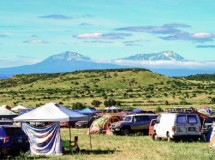In high school I knew I wanted a job that helped me to help others and which had wider "horizons" than just my immediate location.
But I also knew I couldn't do humanitarian work, as the news of famine, violence, human trafficking, natural and man-made disasters would have me in tears within seconds.
Clearly I would have no capability or stomach for frontline service of this kind.
But being a journalist, perhaps that was an alternative way I could help.
To me there was something both honourable and essential about journalists.
Reporting on events and issues, verifying facts, hunting down lies and profiling a situation from as many angles as possible, ideally without judgement - this was a truly vital public service.
It builds understanding, and hopefully tolerance.
It gives individuals and communities reliable information from which they can choose to act, or not, in line with their values and capabilities.
In the end, I did not pursue that career - it may have been a passion, but it wasn't really a talent.
Nevertheless I still remained an avid fan of journalists and respected their intellectual and often dangerous and emotionally draining work.
Sadly, my respect has run out.
For me the increasingly sensationalist and single-issue nature of stories has meant that while I still read the papers and watch the news, I rarely assume that what I read or hear is a balanced representation of the issues.
However, I know that's not true of all parts of the community - and that worries me greatly.
A recent article on the impacts of a proposed mine in New South Wales (NSW), was a classic case of how either the desire for a sensationalist headline or the lack of fact-checking lead to a ridiculous headline.
The story noted how a community action group was fighting to protect the local people by opposing a mine.
The action group justified their cause by referencing a Health study on the possible impacts of the mine which, according to them, noted that üp to 21 deaths a year" might occur as a result of air-borne pollutants from the mine.
Now if I believed that story and thought 21 people a year would die as a result of a new mine, I'd sure as hell demonstrate against it too! But NSW Health was quick to note that the study's findings had been seriously mis-interpreted.
In fact the research showed that far from 21 deaths per annum, the potential risk was more like 1 per century.
Everyone would agree that "no risk of death" would actually be the ideal situation, but no human endeavour is totally free of risk.
So it is the sensationalism to either serve a media machine and/or to further the self-interest of the action group that is the most alarming aspect of the scenario outlined above.
After first checking the facts, if there was still a story to pursue, perhaps there could have been a look at current causes of death on record in the local area - perhaps there are other activities potentially more lethal to the local community? For example, what might the risks of suicide be if unemployment levels increase significantly or if essential services like health services pull out of the area due to dwindling populations? Or perhaps there are other action groups actually in favour of the mine that could provide a counter-point to the group with whom the journalist spoke? For example, does the local Council or Business Chamber have a view on what positive benefits this mine might have on the local community in terms of new employment and training opportunities? Or what sort of impact there might be on small businesses in the area from the mine buying goods and services from local providers? What about a layer above that? What positive benefits this mine might have on the economy as a whole? Perhaps if its thermal coal it is destined for our electricity stations so we can run our households, our offices and our factories.
And without it, perhaps we'd pay more for our energy prices? Perhaps there is an international angle? Perhaps the output is destined for export markets creating wealth on our national balance sheet? Or the royalties paid by the mine might fund new hospitals or roads in other parts of the State? And no doubt there are another dozen angles that could be explored.
The point being that the options we face as individuals, communities and as an economy - all have risks and benefits.
So we have to make choices.
Ideally, as individuals we would make well informed choices.
Taking it a step further, it might even be nice to think we might occasionally and consciously made choices which benefited the majority.
So in the example above, if a risk vs benefit analysis of the opportunity showed the local mine would bring more long term wealth to the area, would help keep downward pressure on energy prices for all of NSW and would add to the national balance sheet more than another potential use of the same land - would it not be sensible for the mine to be supported by the majority? But how can individuals and communities make decisions intelligently if people are not well-informed of the issues and the consequences of their choices? The need for balanced discourse across all mediums of social media, radio, television and print has never been greater.
Sadly, it seems the community may get little assistance from the profession I once admired so much.
But I also knew I couldn't do humanitarian work, as the news of famine, violence, human trafficking, natural and man-made disasters would have me in tears within seconds.
Clearly I would have no capability or stomach for frontline service of this kind.
But being a journalist, perhaps that was an alternative way I could help.
To me there was something both honourable and essential about journalists.
Reporting on events and issues, verifying facts, hunting down lies and profiling a situation from as many angles as possible, ideally without judgement - this was a truly vital public service.
It builds understanding, and hopefully tolerance.
It gives individuals and communities reliable information from which they can choose to act, or not, in line with their values and capabilities.
In the end, I did not pursue that career - it may have been a passion, but it wasn't really a talent.
Nevertheless I still remained an avid fan of journalists and respected their intellectual and often dangerous and emotionally draining work.
Sadly, my respect has run out.
For me the increasingly sensationalist and single-issue nature of stories has meant that while I still read the papers and watch the news, I rarely assume that what I read or hear is a balanced representation of the issues.
However, I know that's not true of all parts of the community - and that worries me greatly.
A recent article on the impacts of a proposed mine in New South Wales (NSW), was a classic case of how either the desire for a sensationalist headline or the lack of fact-checking lead to a ridiculous headline.
The story noted how a community action group was fighting to protect the local people by opposing a mine.
The action group justified their cause by referencing a Health study on the possible impacts of the mine which, according to them, noted that üp to 21 deaths a year" might occur as a result of air-borne pollutants from the mine.
Now if I believed that story and thought 21 people a year would die as a result of a new mine, I'd sure as hell demonstrate against it too! But NSW Health was quick to note that the study's findings had been seriously mis-interpreted.
In fact the research showed that far from 21 deaths per annum, the potential risk was more like 1 per century.
Everyone would agree that "no risk of death" would actually be the ideal situation, but no human endeavour is totally free of risk.
So it is the sensationalism to either serve a media machine and/or to further the self-interest of the action group that is the most alarming aspect of the scenario outlined above.
After first checking the facts, if there was still a story to pursue, perhaps there could have been a look at current causes of death on record in the local area - perhaps there are other activities potentially more lethal to the local community? For example, what might the risks of suicide be if unemployment levels increase significantly or if essential services like health services pull out of the area due to dwindling populations? Or perhaps there are other action groups actually in favour of the mine that could provide a counter-point to the group with whom the journalist spoke? For example, does the local Council or Business Chamber have a view on what positive benefits this mine might have on the local community in terms of new employment and training opportunities? Or what sort of impact there might be on small businesses in the area from the mine buying goods and services from local providers? What about a layer above that? What positive benefits this mine might have on the economy as a whole? Perhaps if its thermal coal it is destined for our electricity stations so we can run our households, our offices and our factories.
And without it, perhaps we'd pay more for our energy prices? Perhaps there is an international angle? Perhaps the output is destined for export markets creating wealth on our national balance sheet? Or the royalties paid by the mine might fund new hospitals or roads in other parts of the State? And no doubt there are another dozen angles that could be explored.
The point being that the options we face as individuals, communities and as an economy - all have risks and benefits.
So we have to make choices.
Ideally, as individuals we would make well informed choices.
Taking it a step further, it might even be nice to think we might occasionally and consciously made choices which benefited the majority.
So in the example above, if a risk vs benefit analysis of the opportunity showed the local mine would bring more long term wealth to the area, would help keep downward pressure on energy prices for all of NSW and would add to the national balance sheet more than another potential use of the same land - would it not be sensible for the mine to be supported by the majority? But how can individuals and communities make decisions intelligently if people are not well-informed of the issues and the consequences of their choices? The need for balanced discourse across all mediums of social media, radio, television and print has never been greater.
Sadly, it seems the community may get little assistance from the profession I once admired so much.
SHARE









































